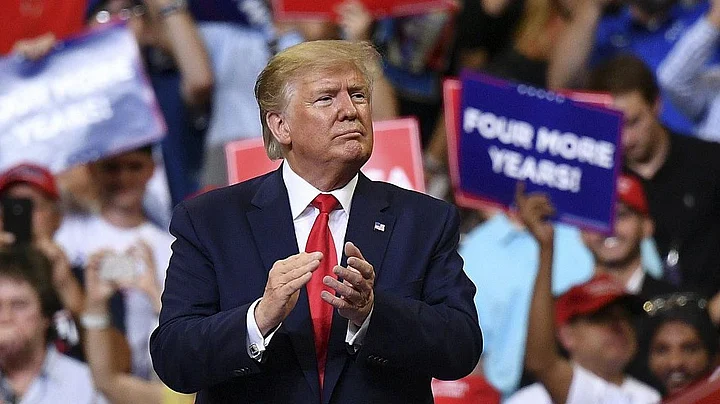A day before the US presidential election, I spoke to Steve, my dorm-mate at University of Washington in Seattle who was out hunting pheasants in South Dakota. “I have my fingers and nuts crossed for a Trump win tomorrow. All signs point to it - but the Democrats are smart with elections. Republicans are Boy Scouts and don’t want to be seen fighting dirty… We had a real Indian American in the race, Vivek Ramaswamy. Hopefully, he’s in the next admin. We do need some South Asian intelligence in the White House - but not Kamala Harris, the cackling border czar,” said he.
Trump did not disappoint Steve.
The election of a leader accused of felony, sexual abuse, and inciting violence to the highest office in the United States speaks volumes, not just about the individual in question, but about the character and values of the American people who propelled him to power with a clear and resounding majority.
In electing a man who openly disregards democratic norms, displays a thirst for vengeance, and tramples on fundamental principles of justice, the American public has, in a way, cast a mirror upon itself. This choice sheds light on a complex national psyche, revealing layers of disillusionment, resentment, and perhaps an unsettling indifference to moral leadership.
The American ethos has long been rooted in democratic ideals: freedom, justice, equality, and accountability. The United States' Constitution champions the checks and balances that keep an individual or branch from wielding excessive power. Yet, recent years have seen a gradual erosion of faith in these principles, driven by partisan polarisation, economic inequality, and a widespread mistrust of institutions.
By choosing Trump, it appears that many Americans are willing to sacrifice their democratic ideals in favour of a figure who promises strength, certainty, and a willingness to upend the status quo.
One way to understand this choice is by looking at the rise of populism in the United States. Populism thrives when people feel alienated from the political elite, convinced that they are not being heard or served by those in power.
“It’s like a lot of Americans have just gotten used to all the accusations and scandals surrounding politicians. I mean, we’re so used to seeing leaders caught up in ethical messes - and most of the time nothing ever happens to them. So, people kind of stop caring because it feels like there’s no real accountability anymore,” said an elderly black man, a lifelong Democrat sitting next to me watching a tennis match at the US Open in New York in September 2024.
“I just might vote for Trump this time.”
Like him, many Americans feel abandoned by a system that, they believe, caters to the interests of a select few rather than addressing the real issues faced by everyday citizens. The result? They look to outsiders, disruptors, and individuals who challenge institutional norms - regardless of that person’s history, values, or moral fitness.
With the lines between truth and partisan spin blurred, accusations of felony and sexual abuse may seem like just another round in a never-ending political boxing match.
This disillusionment permeates cultural and social life, as America grapples with rapid demographic shifts. "Let me tell ya, this ain't just about the dollars and cents. It's way deeper than that. Folks are feelin' lost, like strangers in their own backyard. All these changes—different faces, new ways of livin', and a country where white Americans ain't callin' all the shots—it’s like we woke up in a place that doesn't look or feel like home no more," said my high school friend Jerry, an endearing redneck from Louisiana, a few days before he ‘kicked the bucket’.
When a leader comes along who promises to restore “the way things used to be” - the promise of a return to perceived stability and identity becomes appealing, even if it comes at the cost of democracy and ethical leadership.
So, what does this all say about American character?
On the one hand, it reveals a populace frustrated by unmet needs, alienated from the political establishment, and yearning for voices that resonate with their struggles. However, it also speaks to a troubling willingness to disregard values like justice, empathy, and democratic norms when they seem inconvenient.
By overlooking or even embracing a leader who embodies traits traditionally antithetical to democracy, Americans may be revealing that they prioritise strength over integrity, revenge over reconciliation, and short-term gains over long-term principles.
In electing Trump, Americans have exposed their willingness to gamble with the very principles upon which their nation was built.
If this path continues, it may come at the cost of the democratic ideals that have, for centuries, inspired people around the world. The real test, then, lies in whether America can look in the mirror, confront the values it has chosen, and remember the foundation on which it stands - or whether it will continue down a path that risks forsaking its ideals for the promise of fleeting, and ultimately hollow, power.
(Akhil Bakshi, an author and explorer, is a Fellow of the Royal Geographical Society and Explorers Club USA, and Editor of ‘Indian Mountaineer’. He is also the founder of Bharatiya Yuva Shakti, an organisation that ensures good leadership at the village level. He tweets @AkhilBakshi1. This is an opinion piece and the views expressed above are the author’s own. The Quint neither endorses nor is responsible for the same.)
(At The Quint, we question everything. Play an active role in shaping our journalism by becoming a member today.)
